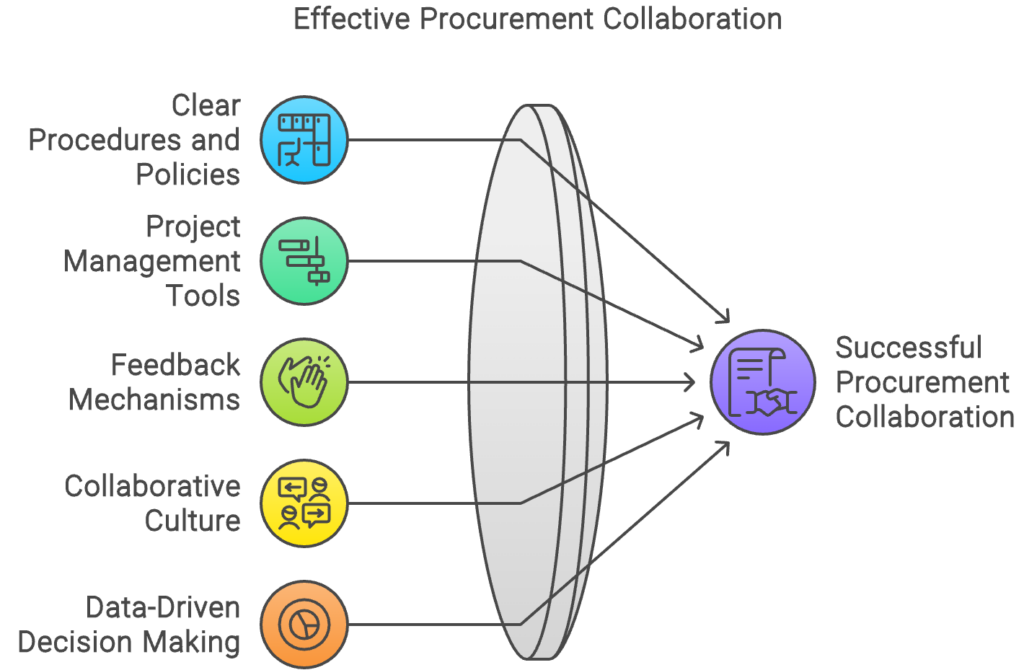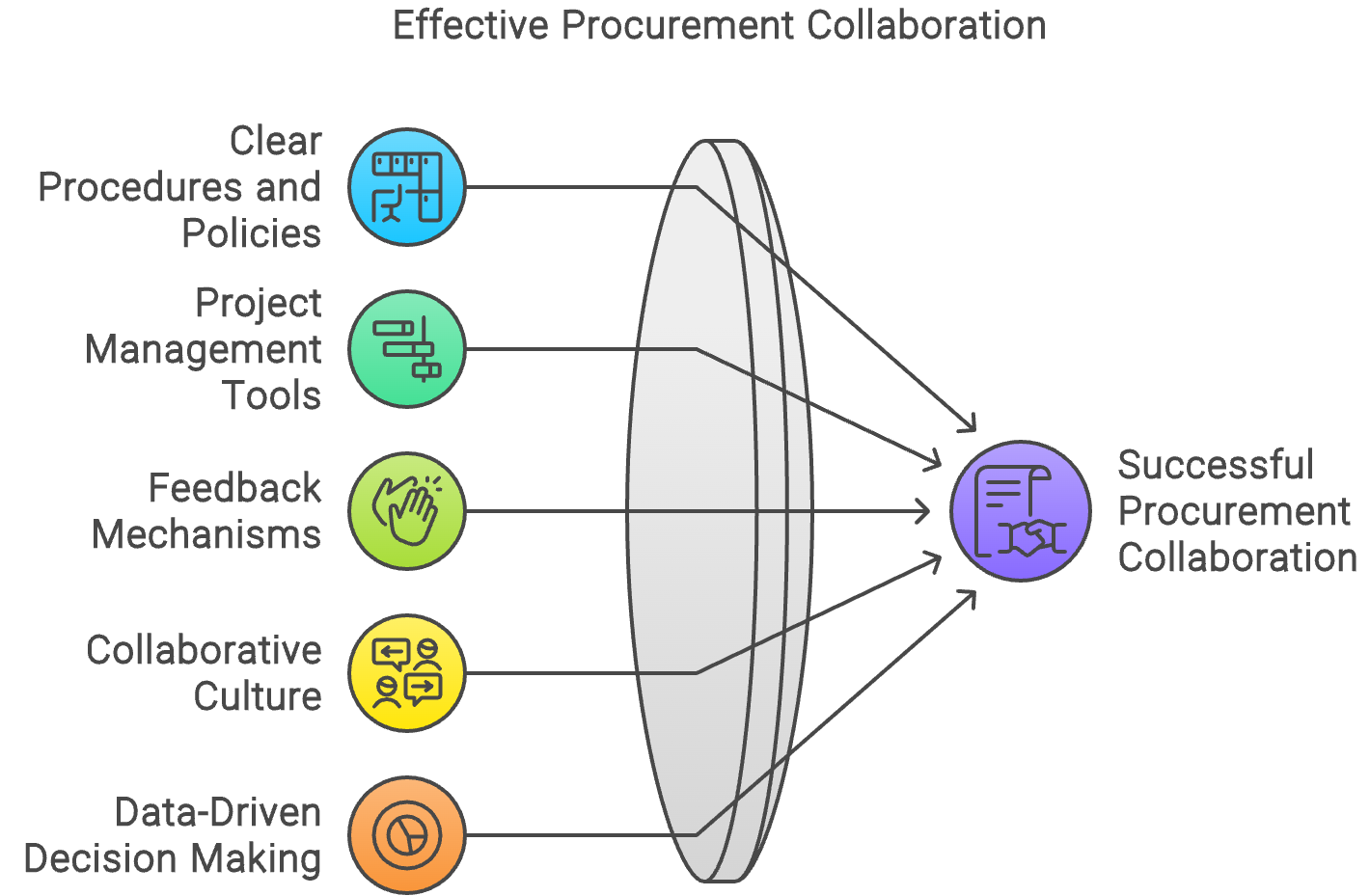| Key Takeaways |
|---|
| • Procurement collaboration is essential for cost savings, efficiency, and better decision-making |
| • Effective collaboration requires clear procedures, regular communication, and cross-functional engagement |
| • Technology plays a crucial role in facilitating real-time collaboration and data sharing |
| • Overcoming barriers like lack of trust and misaligned priorities is key to successful collaboration |
| • Case studies demonstrate significant benefits of procurement collaboration across industries |
To improve procurement collaboration is to open up new opportunities for organizations seeking enhanced efficiency, cost savings, and strategic value. Procurement collaboration refers to the coordinated efforts between internal departments, external suppliers, and other stakeholders to optimize the purchasing process and drive better business outcomes. In today’s interconnected business environment, the importance of collaboration in procurement processes is significant. By fostering a collaborative environment, companies can use collective expertise, streamline operations, and achieve competitive advantages.
Types of Procurement Collaboration
Internal Collaboration
Internal collaboration in procurement involves the coordination between various departments within an organization. This includes:
- Procurement and Finance: Aligning budgets and financial goals with procurement strategies.
- Procurement and Legal: Ensuring compliance and risk management in supplier contracts.
- Procurement and Operations: Coordinating supply chain efficiency and inventory management.
To improve procurement collaboration internally, organizations can implement the following strategies:
- Schedule regular cross-functional meetings to discuss procurement needs and challenges.
- Implement early engagement protocols for involving procurement in project planning stages.
- Provide comprehensive training on procurement processes to all relevant stakeholders.
External Collaboration
External collaboration focuses on building strong relationships with suppliers and vendors. This type of collaboration offers several benefits:
- Cost Savings: Negotiating better terms through long-term partnerships.
- Innovation: Using supplier expertise for product development and process improvements.
- Risk Mitigation: Sharing market insights and collaborating on contingency planning.
Effective external collaboration strategies include:
- Implementing supplier relationship management (SRM) programs.
- Conducting regular performance reviews and feedback sessions with key suppliers.
- Engaging in joint innovation initiatives and co-creation projects.
Key Stakeholders in Procurement Collaboration
Internal Stakeholders
Internal stakeholders play crucial roles in the procurement process:
- Finance: Provides budget oversight and financial analysis.
- Legal: Ensures contractual compliance and risk management.
- Operations: Defines product specifications and quality requirements.
To improve procurement collaboration, it’s essential to align the goals and objectives of these stakeholders through:
- Developing shared key performance indicators (KPIs).
- Establishing clear communication channels for project updates and issue resolution.
- Creating cross-functional teams for major procurement initiatives.
External Stakeholders
External stakeholders, primarily suppliers and vendors, are integral to the procurement ecosystem. Effective collaboration with these partners involves:
- Treating suppliers as strategic partners rather than mere vendors.
- Implementing transparent communication protocols for sharing forecasts and market insights.
- Engaging in joint process improvement initiatives to drive mutual benefits.
Best Practices for Effective Procurement Collaboration

To truly improve procurement collaboration, organizations should adopt the following best practices:
- Develop Clear Procedures and Policies: Establish well-defined procurement guidelines that outline roles, responsibilities, and decision-making processes.
- Utilize Project Management Tools: Implement collaborative platforms for tracking progress, sharing documents, and managing procurement milestones.
- Establish Feedback Mechanisms: Create channels for continuous improvement through regular surveys, performance reviews, and lessons learned sessions.
- Encourage a Collaborative Culture: Foster an environment where cross-functional teamwork is valued and rewarded, supported by senior management commitment.
- Implement Data-Driven Decision Making: Utilize analytics tools to gather insights and make informed procurement decisions collaboratively.
Challenges in Procurement Collaboration
Despite its benefits, procurement collaboration often faces several challenges:
- Lack of Communication: Isolated departments and poor information sharing can hinder collaboration.
- Misaligned Priorities: Different goals and KPIs across departments can lead to conflicts.
- Resistance to Change: Established processes and cultural norms may impede new collaborative approaches.
To overcome these challenges and improve procurement collaboration, organizations can:
- Invest in change management programs to facilitate cultural shifts.
- Implement cross-functional training initiatives to build understanding across departments.
- Establish clear governance structures that promote collaborative decision-making.
The Role of Technology in Procurement Collaboration
Technology plays a key role in enabling effective procurement collaboration:
- Collaborative Platforms: Cloud-based procurement solutions facilitate real-time communication and document sharing.
- Data Analytics: Advanced analytics tools provide insights for strategic sourcing decisions.
- Automation: Robotic Process Automation (RPA) streamlines routine tasks, allowing teams to focus on strategic collaboration.
Implementing these technologies can significantly improve procurement collaboration by:
- Enhancing visibility across the procurement lifecycle.
- Enabling data-driven decision-making through shared analytics dashboards.
- Facilitating seamless communication between internal and external stakeholders.
Conclusion
To improve procurement collaboration is to unlock numerous benefits for organizations, including cost savings, enhanced efficiency, and strategic value creation. By fostering a culture of collaboration, leveraging technology, and addressing common challenges, companies can transform their procurement functions into strategic drivers of business success. As we look to the future, the importance of procurement collaboration will continue to grow, with emerging technologies like AI and blockchain promising to further revolutionize collaborative procurement practices. Organizations that prioritize and invest in improving their procurement collaboration capabilities will be well-positioned to succeed in an increasingly competitive and complex business landscape.



